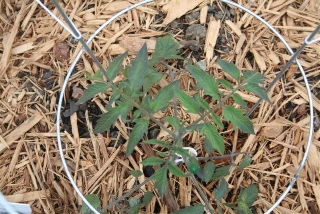
Are
your tomatoes purplish? Mine are.
They looked pretty normal,
although leggy, coming out of the warm greenhouse
but once they were out a couple days they began demonstrating
the condition called "Pi Starvation". That
means that the plant is blocking sunlight by an increase
in anthocyanin. The plant needs phosphorus and can't
draw it up from the soil. The causes could be that
the roots are too small to make the mighty pull, there
is too little in the soil (probably not the case)
and/or the soil is too cold. I am pretty sure the
first and third are true for most of us.
Once the soil
warms up and the roots get a chance to grow, most
local soil has enough phosphorus to keep the plant
green. Tomatoes actually like a cooler soil at night,
but not during the day, day after day after day, like
we have had. A little water-soluble chemical non-contaminated
fertilizer like Miracle Grow works well to help out
the tomatoes in cool weather because it is absorbed
by the leaves.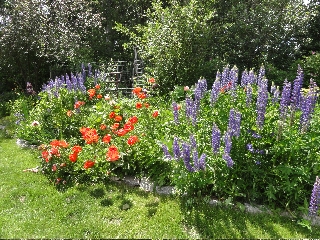 I
expect we might have a big change in temperatures
soon and everything will warm up and dry out and the
little roots will need all the help they can get to
not transpire out all their water through the leaves
before they can get some from the roots. I plan to
water more often to give my starts a break if have
not had time to grow bigger roots in the cold soil
before getting hit with a sudden change to heat. I
expect we might have a big change in temperatures
soon and everything will warm up and dry out and the
little roots will need all the help they can get to
not transpire out all their water through the leaves
before they can get some from the roots. I plan to
water more often to give my starts a break if have
not had time to grow bigger roots in the cold soil
before getting hit with a sudden change to heat.
I
suspect many of the ornamentals in my garden are about
three weeks late. I love the blue lupine and the big
honkin' oriental poppies. I keep this variety of lupine
wet because when it dries out it goes into stress,
sends out some kind of message and the unique lupine
aphid appears spontaneously. The lupine aphid is the
world's largest.
Aphids are born pregnant.
They are nature's own Russian doll (one inside another
inside another and so on). I can keep a pretty healthy
crop of spontaneously-appearing ladybugs and ladybug
larvea going but I'd rather not because they cannot
keep up. I cut down the lupine tops right away to
tidy things up and it doesn't seem to slow them up
at all. They re-leaf and sometimes re-bloom. The chickens
don't eat them as they have a toxin. Claude Miller
says the seeds are toxic to horses and the books agree.
I have quite a few in my emergency horse pasture (well
above floodplain!).
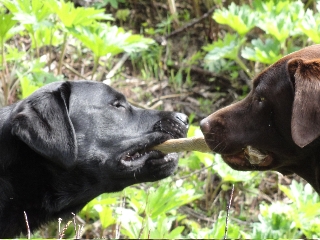 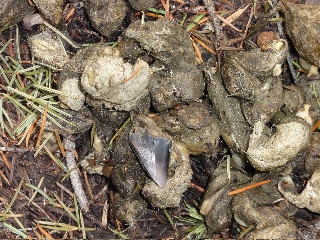
My husband Steve gets out
into the country almost every day. He is not into
garden chores in front of or behind the deer fence.
His contribution to the column, deer related only,
is this photo. Sort of gross but rather amazing -
this is cougar poop with a tiny deer hoof in it. Our
labs found the other tiny leg and hoof a short ways
away. They are demonstrating their find.
I
have been home tending the garden, enjoying the lack
of watering chores and bemoaning the lack of plant
growth. The
cool season stuff is finally moving along and the
herb garden looks pretty sweet.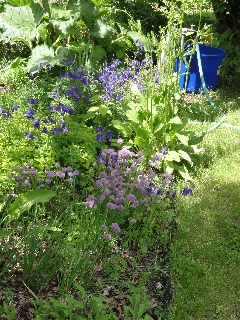 
The
new raspberries have a ways to go but they look fine.
The two-year-old raspberries are cranking. The bumblebees
are all over them. Late planted lettuce is small but
coming.
The
chick business is what is really keeping me busy.
We now have the final eggs hatching in the incubator
and under a couple broody hens. The hens drive me
crazy so I sometimes let them continue brooding and
place some almost ready-to-hatch eggs under them.
Some do an OK job, some are total failures and the
chick dies of neglect. Sad we have bred out so much
of the mothering instinct. Hope we never have to feed
ourselves without mass commercial agriculture and
electric incubators!
Here are a couple of my
first-time mamas doing their thing. The Barnvelder
hen has her first chick. She is stuck in the biggest
dog plastic dog kennel for safety. The Rhode Island
Red/Cochin mom is close to hatch. Both have chicks
or eggs that enjoyed the safe incubator life. Their
own offspring had rugged times as they both shoved
and piled on each other in the same nest box for two
weeks. Eggs shifted from one to the other and occasionally
spent the night out in the open. The RIR/Cochin is
sitting in luxury in a broody coop thanks to master
carpenter Ben Gilmore. Thank you Ben!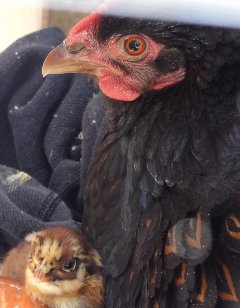 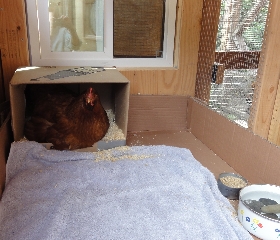
Let's
all hope
for an easy transition to summer weather and some
frost- free time in September for all those vegetables
to come in. Maybe we will be so lucky!
Thanks for
reading,
Jane G |

